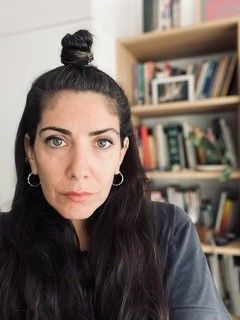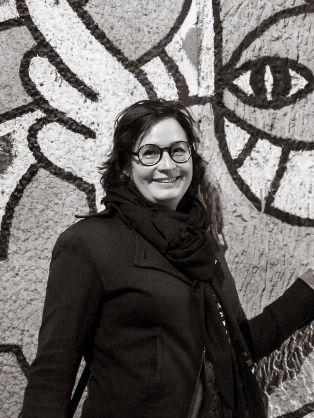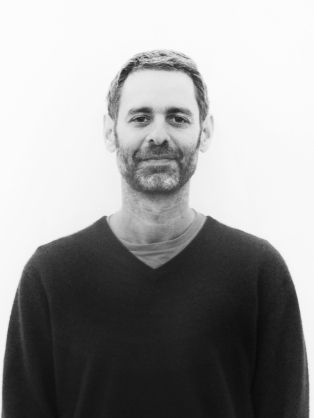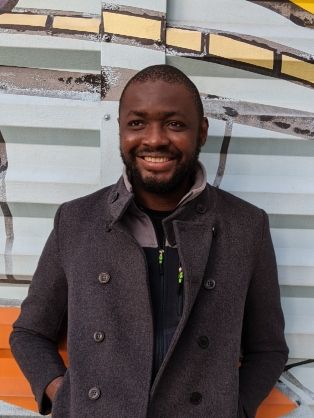Interview: Selection Committee 2025
Who will take their seat on the famous Talents blocks, joining us in HAU Hebbel am Ufer for Berlinale Talents 2025? It's not an easy job for our Selection committee, but after two months of reviewing over 3,800 applications the selection has been finalised and applicants have been notified. Find out all about how they whittle the numbers down from almost 4,000 down to 200 Talents.

- How have you found this year’s selection process so far?
Will: It has been exciting as always. Every year we get a record number of applicants so it is always tough to make decisions that whittle down the numbers. We have to select only 200 people across the various labs, studios and the summit but we could easily pick another 200 from the pool, there are so many brilliant applicants. That goes to show you how competitive the programme is.
Agustina: Great! Working with the rest of the committee in the search for upcoming filmmakers to create an exciting group of people for the Summit is always a pleasure, as it makes us discuss and exchange ideas during the whole process. So,in that sense it's always a great experience, but on the other hand it can be very hard as there are a lot of great people making great films around! Finding a balance between the industry and the arthouse films and authors, bringing in both sides in order to create a more diverse group in terms of production and possibilities, can be hard. That balance is essential though, especially considering that this year’s theme relates to the art of listening – how important it is to learn to listen and to discuss with people in and with different positions, both professionally and personally.
- Aside from the regular application requirements, what is it that you look for in the applications?
Gabor: Beyond something outstanding, some special energy or original voice that makes the applicant stand out, we are looking for talents with some experience already who are ready to share and bring new ideas and energy to the summit. At the same time, there should still be space to learn and to connect.
Agustina: I think it has to do with the balance of the whole profile, in terms of what have you previously done and what are you currently doing. In that sense, the sample choice is vital in order to really show your cinematic cosmovision, or at least your authentic approach to cinema. It is not just technique but also sensitivity and the type of projects or films you are involved in. It is also important to consider the timing of the application in the career of the filmmaker. If you haven't been able to do much in the last years, it can sometimes be better to wait until you have more going on in terms of production. There is also very much the opposite side, cases in which the applicant is very well established in their professional career and might not need or benefit as much from what Berlinale Talents can offer.
Will: The late great former Project Manager Christine Tröstrum once said that Berlinale Talents is for that moment when your career starts to get serious. I think that is the perfect description. It is for filmmakers and creatives who are in that phase where they are now upcoming or mid-level professionals. Now this could mean many things, as the bracket is very wide. We like to see people who have demonstrated they can start a project and see it to fruition, better luck if the project has been warmly received commercially or critically. It could also mean your affinity to attract a certain type of quality in your work, or the quality you bring to the project. Your body of work can be considered as a whole, sometimes it is your 3-minute sample that tips things in your favour. It all depends really. Then there are intangibles such as timing, number of competitive entries from a region - we cannot accept everyone from one country, for instance, no matter how many brilliant entries show up. It is really a mix of all of these things and hard to be super specific.
Dana: The personal questions and videos are always helpful to get to know the applicants a bit better, than through their filmography (but please, people, make sure they are updated and complete and save us the online fact checking). We are not only looking for experience, and that little spark that speaks from their work, but for as many voices to be included in the summit. There is a lot to take from Berlinale Talents, but what are you sharing? What experiences do you have both in cinema and in life, what ideas do you bring about the future of cinema or cinematic arts such as telling stories in non-linear media? Filmic arts are the zenith of our media saturated times, and we always love to talk with the Talents about what they represent on all levels. They are the eyes, ears, and voices of the future after all.
- What makes an application stand out to you?
Gabor: For me, it's an original voice, motivation and energy as well as a striking work sample which really makes a strong impression.
Agustina: There is the saying “an image is worth a thousand words” and for me that kind of reflects my view and impression of a profile. The sample is so significant. Of course, it's super important to be able to describe and to support those images with text, but we are mainly talking about cinema therefore, sounds and images and the use of them are central. Besides any prizes or career milestones, it's important to see the unique voice behind that is trying to push forward cinematic language. Nevertheless, what often creates a positive impact is how aware one is to surrounding reality and what are you are trying to achieve with your work.
Will: Yes, I agree, it tends to be applicants who present a strong clip or work sample. Think of the sample as your audition moment, so you want to present work that speaks strongly of you and represents everything you want to communicate to us. We like applicants who are confident, self-assured, and aware of their place in their local industry but also in the global film community. Highlight your strengths, some of your weaknesses and limitations, but present an overall positive picture of why you should be the one person selected out of thousands. Well-written, thought-through responses will always trump lazy, redundant answers.
- What’s your favourite part of being a member of the selection committee?
Will: What can I say? It is the sense of discovery for me. There are so many applicants whom I have come across for the first time during the selection process and I find that I am very much interested in following their work going forward and it doesn’t matter if they were selected or not. Conversely, when I attend film festivals now, I am unconsciously on the lookout for fresh and upcoming talent whom I might meet during the application process and it brings a sense of familiarity to the job. I also love working with the team past and present; from my fellow committee members to Nikola, Tobias, Lira and her awesome team. Everyone is just wonderful and super helpful.
Gabor: Exactly, to be able to discover new and original voices and to feel the energy and originality of upcoming filmmakers – also from more hidden places of the world.
Agustina: I truly and deeply enjoy the opportunity to watch samples from all over the world and learn about what is up in artists' minds around the globe. It gives you a general idea of what is going on in terms of concerns and new aesthetics or more conservative forms turning into new ones. Somehow it gives me a warm feeling that not everything is lost. On the contrary, it is art and culture that keep opening doors and windows around the planet. It is also incredible to see that diverse digital formats are making a comeback, and a few resisting with film in S16mm and 35mm.
Dana: My favourite part is being part of something bigger, feeling connected with filmmakers from all over the world who are looking to connect to other filmmakers from all over, to learn, and, with this year's theme in mind, listen courageously to each other. An after effect of this is another favourite: meeting people who tell you they were part of Talents once. This really makes you realise the enormous impact of a programme like this. Artistically, but also socially.
- Have you noticed any common themes across the applications this year?
Gabor: There has been much discussion of right wing tendencies arising in many parts of the world, as well as climate and environmental crisis, AI and its impact on the industry.
Agustina: Yes, certain themes seem to span lots of applications each year, and particularly this year I caught a general concern about the conservative governments and, especially in that context, the importance of supporting diversity. Of course, a constant issue is how to make a professional living within the filmmaking and how important it is to have public policies regarding cultural and cinema financing, and how the fluctuating economy crisis affects the industry as well.
Will: I found many anxieties surrounding generative AI. It is interesting to observe how different people are managing this development in their own ways. Some are genuinely worried over issues like job disruptions, creative freedoms, loss of incomes while others are all for embracing the technology and incorporating it into their creative flow.
Dana: Thankfully, a lot of filmmakers are looking beyond the horizon of their next production to the world we are living in: how do we tell stories in a polarised world, divided by war and inequality? Of course, the situation in Gaza is of great concern to many.
For a number some years now, people have been engaging with the climate crisis and thinking about a greener and more sustainable way to organise the industry. Artificial Intelligence is an important topic in this regard. Of course, everybody knows about the energy cost of one simple prompt to an image or text generator. This year however, no doubt inspired by the Hollywood strikes of last year, you can see young filmmakers also addressing the topic from an equally more important approach, of how to gain experience. If all the assistant jobs, like reading 100s of screenplays and gaining dramaturgical insight through that, or working on a budget, are taken over by A.I, how do you gain the experience that makes you ready to become a producer or an editor? Learning on the job has always been the way to polish your skills and your craft.
- What is your top tip for those who would like to apply next year?
Gabor: Try to be specific in your answers, tell us more about your motivation and the force that makes you want to be a filmmaker. Usually the short video in which you explain your pressing subject matter is really helpful because it gives us a good impression about you.
Agustina: To be brief but detailed, meaning - try to say something that defines you as a person and your cinematic vision. If you narrate your entire life in bio but none of that is really related to your current work, then it is just not that important. Last but not least, be aware of the themes you address. Don't just try to approach something that is currently in vogue if it's not really what interests you, because it will show somehow, that piece will become stiff or generic.
Will: It isn’t too early to start processing what you might want to communicate to the selection committee next cycle. Just the bare bones of an idea is fine, you can then work on fine-tuning or fleshing them out the rest of the year. Earlier is always better than late. Also just go on doing the best work that you can. Take note of your career wins, update your filmography. Put in whatever you think will help make a case for you and be prepared to trim the fat. May the odds be in your favour.
Dana: Make sure you are applying at a suitable time in your career. Ideally you apply for Berlinale Talents with a bit of experience. That can be around five years after you finished film school, or if you bring in a bit of experience in the international film festival world, or having had works distributed or screened through major channels. But at the same time we are always on the lookout for the outsiders and autodidacts. In the end it is the quality of the work, and their vision on the medium and the film world.
The Selection Committee
Agustina Arbetman - Cinema director graduated from the University of Cinema and graduate in Creative Writing from UNTREF. Works professionally in the area of programming and curatorship since 2008, being the Program Coordinator of Talents Buenos Aires among others. Taught diverse staging courses as well as literature and curated short film programs for festivals in Africa, Asia and Europe. On the side, she develops her independent artistic practice and her latest pieces participated in the National Prize 8M 2021 and 2022 respectively and both works were exhibited at the Kirchner Cultural Center. She received a grant from the National Fund for the Arts to develop her upcoming theatre play. In the past years she was a jury member of FIDOCS (Chile) and tutor of DOCSMx (Mexico), in both cases in the emerging artists section. Her first published book was presented in May 2023 at the International Book Fair Buenos Aires.

Dana Linssen is a Dutch film critic, philosopher and writer. She is the former editor-in-chief of de Filmkrant magazine, a long-standing film critic for NRC Handelsblad, the founder of the Slow Criticism Project and a curator of the Critics’ Choice at the International Film Festival Rotterdam. She has received several awards for her work as a film critic and has served as a Talent Press mentor for many years.

After his studies of Cultural Management in Vienna, Birmingham and Chicago, Gabor Greiner worked as a journalist and film critic. In 2003, he moved to Brussels to take charge of the distribution support department of the MEDIA Program at the European Commission’s Film Fund. In 2009, Gabor became acquisitions executive at the international sales agent, The Match Factory. In August 2010, Gabor moved to Berlin to take over acquisitions of the French-German sales company, Films Boutique, winner of the Golden Bear in 2017 and 2020 and the Golden Lion in 2011 and 2016. Gabor is a member of the European Film Academy.

Wilfred Okiche is a film and culture critic with considerable experience in African and international cinemas. He has attended critic programs and reported from film and theater festivals in Locarno, Rotterdam, Stockholm and Sundance. Wilfred has worked in programming teams for Film Africa in London and the Encounters International Documentary Festival in South Africa. Wilfred has mentored fast rising film critics at Talents Durban. This is his third year on the selection committee of Berlinale Talents. His writing has appeared in Variety, IndieWire, The Continent and Senses of Cinema among other publications. He is a member of FIPRESCI and has participated in juries at the Berlinale and the Carthage film festival. He is in first year of grad school studying film and media studies at the University of Southern California.
